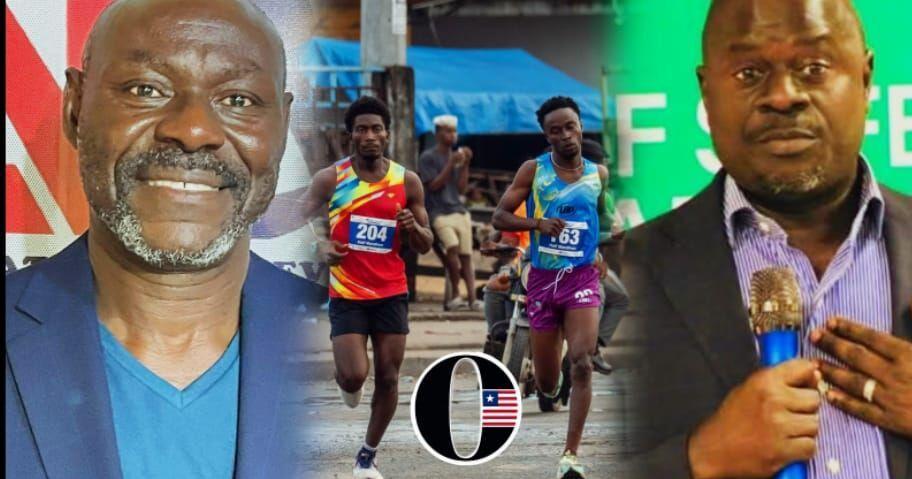Africa-Press – Liberia. Liberia’s Track and field program is hanging on a shoestring. Official government budget allocations for the sport average in the low three figures, deferred to 2027. The Ministry of Youth and Sports (MYS) officials say they rely heavily on external support to run the program.
Money was a running theme throughout the Liberia Marathon 2025, which took place last Sunday. The event leant rare visibility to Liberian track and field and its local stars. The Daily Observer livestreamed the event, a full and half marathon, in partnership with KMTV, interviewing officials, present and former athletes on the challenges and possibilities for the sport.
Zero Budget Allocation Fuels Frustration
We spoke to Hassan Kiawu first. Now Deputy Director General for Media Services at the Liberia Broadcasting System (LBS), Kiawu is a celebrated Liberian athlete who specialized in track. On Sunday, we caught him at the finish line, leading a team of timekeepers.
In a wide-ranging interview discussing his own experience and the significance of the marathon, Kiawu was optimistic about the future of Liberian track, given the existing and potential talent. His dismay was over the budget.
According to Kiawu, the MYS segment of the 2025 National Budget, released by the Ministry of Finance and Development Planning, allocates zero funding to the Track and Field Federation. The budget only projects funds for 2027. The George Manneh Weah administration had also recorded zero allocation, for much of its duration, with only $246 allotted in the 2024 budget.
“It is a big shame that the Government of Liberia… [is not] focusing on improving this sport,” Kiawu lamented. He called the minimal official funding “my pocket change,” emphasizing the massive public focus on football, which overshadows all other sports.
Government Highlights Off-Budget Figures and Budgetary Transfers
Deputy Minister of Youth & Sports G. Andy Quamie said track is getting funded regardless of the GOL’s budget constraints. In fact, he says, the Track and Field is among the most supported in the country, largely through off-budget expenditures.
Speaking last night at the Liberia Marathon Trust’s post-race appreciation event, held at Royal Grand Hotel, Quamie explained, “The Athletics Federation is more supported than most federations in the Republic of Liberia… With the 36 federations in Liberia, the Athletics Federation is among the first five that is well supported.”
He acknowledged that football receives the “lion’s share” but clarified that federations are independent bodies, which receive external support. Government funding for them often occurs outside the rigid budget lines and mostly supports participation in international sporting events.
“If we depend on the budget, they will not go [abroad],” Quamie explained. Citing a recent example, he said “the Athletes Federation just came from Japan. They spent US$150,000, not from their budget. We [transferred] it from another budget line.” He added that the government had spent over $3 million on sports alone outside of the $500,000 designated budget line.
Need for Marketing and Corporate Engagement
Despite the inadequate government support, there is consensus that the sport needs significant marketing and private sector involvement to survive. In that direction, Mr. Kiawu urged athletes and administrators to “step out of our comfort zone” and build a rapport with the business community.
But public indifference is a major hurdle, he says. Football reigns supreme, in Liberia. The Track program will have to do more to compete for national attention.
Kiawu proposed leveraging the success of Liberia’s international stars—such as Joseph Fahnbulleh, Emmanuel Matadi, and Thelma Davies—by bringing them home for public relations and marketing campaigns. “When these guys are called on for the World Cup or Olympic Games, we need to bring them to Liberia. That is marketing and public relations,” he continued.
Kiawu also stressed the importance of local athletes participating in more regional leagues to raise visibility.
Run or Get Off the Track
It is these local athletes, including those participating in para-sports, who bear the brunt of the financial constraints. And, on Sunday, they did not hide the hurt, nor the hunger to win.
Moses Sackie, a five-time racer and participant in the 2025 Liberia Marathon Wheelchair Race, pleaded with organizers for better support.
His first request was for “an international [standard] wheelchair for racing, because most of us our wheelchair is not good.” Other runners echoed the need for equipment and training support.
Sackie also criticized the low cash prizes, which saw him, as the 10k wheelchair race winner, receive only US$200.
Ultimately, Kiawu challenged the government to either properly fund track and field or remove it entirely. He added that the sport’s exclusion, even from the popular National County Sports Meet — a missed opportunity, in his view. He suggested at least an exhibition event should be held at the National County Sports Meet, to generate public interest.
It appears to be a bumpy path forward for Liberian track and field, if it remains reliant on sporadic non-budgetary government support. Securing stable, official funding, while aggressively marketing its international success, will help attract the vital sponsorship that can supplement. The question, as always, is a matter of political will.
For More News And Analysis About Liberia Follow Africa-Press






